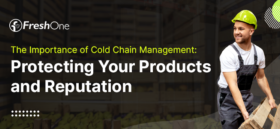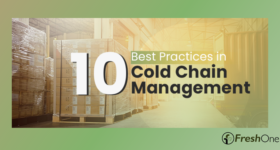The journey from farm to table is more than a simple transportation issue. For businesses in the food industry, keeping perishable goods in perfect condition, safe, fresh, and ready for consumers to enjoy remains daunting and worrisome.
This is where cold chain management becomes a hero, albeit unsung, safeguarding public health and a company’s reputation.
What is Cold Chain Management?
Cold Chain Management is a critical process that involves the transportation and storage of temperature-sensitive products, including everyday essentials like dairy products, to crucial supplies, such as pharmaceuticals, under controlled conditions. This meticulous system demands advanced equipment, specialized handling, proper packaging, and continuous temperature monitoring to ensure products retain their quality, effectiveness, and safety. It’s a fundamental practice, particularly in industries such as healthcare, food services, and agriculture, where the condition of products is directly linked to consumer safety and product efficacy.
Prioritizing Public Health and Product Excellence:
Cold chain management isn’t just about keeping your salad crisp or milk fresh. It’s about ensuring that from the moment a product is made to when it’s in your hands, it’s safe and of top quality. Perishable foods are delicate. Exposure to temperatures above 5 degrees Celsius can rapidly invite the growth of harmful microorganisms, presenting a clear and present danger to health.
But there’s more to it than just keeping food safe. Proper cold chain management shows that a brand cares about quality, which helps build customer trust. With everyone more aware of their health and making smarter food choices, this commitment to quality is more important than ever.
When companies are strict about their cold chain, they do more than protect their products. They’re looking out for their customers and the community by reducing the chances of foodborne illnesses. And at the same time, they’re supporting bigger goals like global food security and sustainable practices. It’s a win-win!
Impact on the Bottom Line and Brand Image:
Mishaps in cold chain management have far-reaching effects, stretching beyond public health into a company’s financial health and reputation. Shockingly, global statistics show that one out of every three food items is squandered because of flawed cold chain practices. This inefficiency doesn’t just signify lost goods; it represents a domino effect of wastage, including the resources expended in production, logistics, and storage.
For companies, this scenario underscores a high-risk gamble. In an era where consumer feedback can circulate quickly and widely, a brand’s standing is perennially on the line. Product safety isn’t just a regulatory requirement; it’s a cornerstone of a company’s customer relationship.
A reliable and agile cold chain is more than a logistical requirement; it’s a strategic tool in a business’s arsenal, defending against brand and financial damage that could spiral from even one isolated spoilage incident. Mastery in cold chain management marks a business’s commitment to excellence, establishing a fortress of trust around the brand and nurturing enduring ties with consumers.
Conclusion and Takeaways
Wrapping up, the role of cold chain management in maintaining product quality and consumer trust is undeniable, and it becomes increasingly significant as global supply chains grow more complex. Ensuring the safety and durability of temperature-sensitive products is not just a logistical challenge but a commitment to quality that customers value deeply.
This is where FreshOne excels. Established in 2006, we’ve become a trusted name in cold chain logistics, offering reliable, temperature-controlled distribution and warehousing services. Our dedication to keeping your products fresh is unwavering. But what sets us apart is our emphasis on transparency and innovation. We provide transparent, straightforward logistics solutions supplemented by advanced ordering technology to guarantee your products are delivered at their optimal condition, ensuring the right balance of temperature, timing, and cost.
At FreshOne, we prioritize consumer trust and product integrity, offering logistics services beyond logistics. They pledge consistency and quality without compromise, ensuring your brand’s reputation for excellence and reliability.


